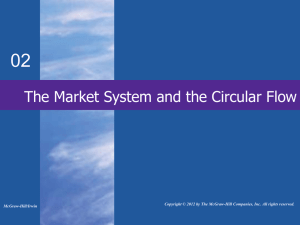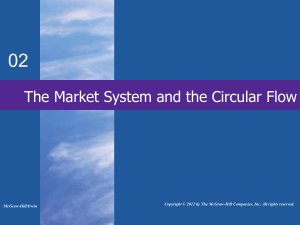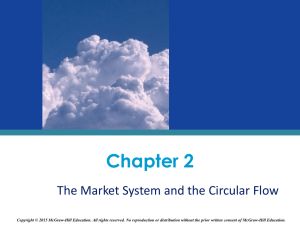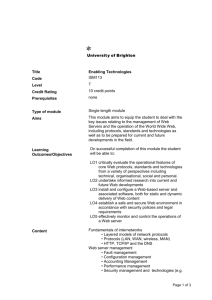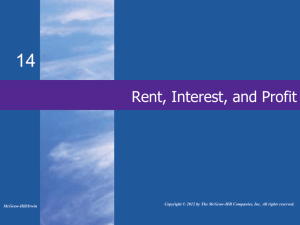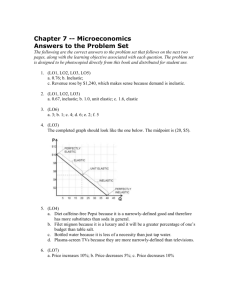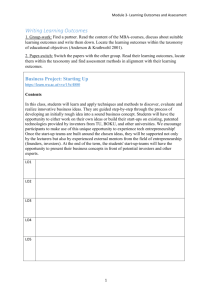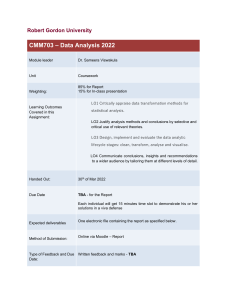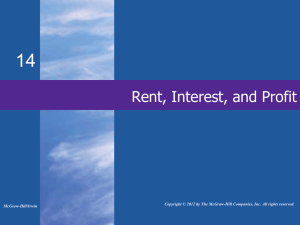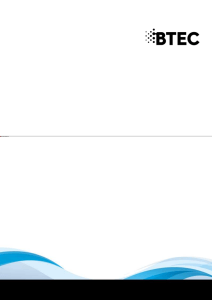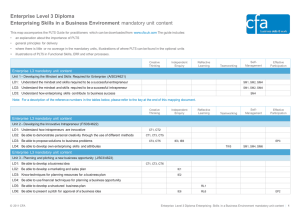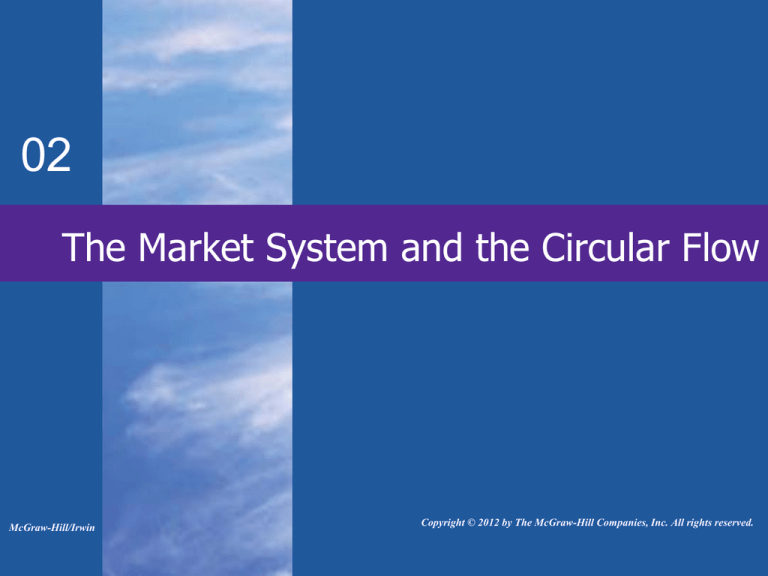
02
The Market System and the Circular Flow
McGraw-Hill/Irwin
Copyright © 2012 by The McGraw-Hill Companies, Inc. All rights reserved.
Economic Systems
• Set of institutional arrangements
• Coordinating mechanism
• Differences in systems exist by:
• Who :
• What method is used to:
LO1
2-2
The Command System
• Known as socialism or communism
Characteristics:
1.
2.
LO1
2-3
The Market System
• Known as capitalism
• Define:
• EX: Australia, Switzerland, U.K.
LO1
2-5
Characteristics of the Market System
• Private property
• Freedom of enterprise and choice
• Self-Interest
• Competition
• Markets and prices
LO2
2-6
Use of Money
• Makes trade easier
LO2
2-7
Global Perspective
LO2
2-8
Technology and Capital Goods
• Advanced technology and capital
•
goods are encouraged.
Specialization
• Division of labor
• Geographic specialization
LO2
2-9
Active, but Limited Government
• Government may be needed to
•
LO2
alleviate market failures
Government can increase
effectiveness of a market system
2-10
The Five Fundamental Questions
• What goods and services will be
•
•
•
•
LO3
produced?
How will the goods and services be
produced?
Who will get the goods and services?
How will the system accommodate
change?
How will the system promote
progress?
2-12
What Will Be Produced?
• Goods and services that create a
•
LO3
profit
“Dollar Votes”:
– 1.
– 2.
2-13
How Will the Goods Be Produced?
• Minimize the cost per unit by using
the most efficient techniques
• Technology
• Prices of the necessary resources
LO3
2-15
How Will the Goods Be Produced?
Three Techniques for Producing $15 Worth of Bar Soap
Units of Resource
Price per
unit of
Resource
Resource
Technique 1
Unit
s
$
Technique 2
Cost
Technique 3
Cost
Units
Units
8
2
$ 4
1
Cost
Labor
$2
4
Land
$1
1
1
3
3
4
4
Capital
$3
1
3
1
3
2
6
Entrepreneur
$3
1
3
1
3
1
3
$ 15
LO3
$ 13
$
2
$ 15
2-16
Who Will Get the Output?
• Consumers with the ability and
•
LO3
willingness to pay will get the product
Ability to pay depends on income.
2-17
How Will the System Change?
• Changes in consumer tastes
• Changes in technology
• Changes in resource prices
LO4
2-18
How Will the System Progress?
• Technological advance
• Creative destruction
• Capital accumulation
LO4
2-19
The Market System
• 1776 Wealth of Nations by
Adam Smith
–Efficiency
–Incentives
–Freedom
Invisible Hand
• 1776 Wealth of Nations by Adam
•
LO4
Smith
• Unity of private and social interest
Virtues of the market system
• Efficiency
• Incentives
• Freedom
2-21
Demise of Command Systems
• Soviet Union, Eastern Europe, and
•
•
•
LO4
China
System was a failure
The coordination problem
• Set output targets for all goods
The incentive problem
• No adjustments for surplus or
shortage
2-22
The Circular Flow System
RESOURCE
MARKET
•Households sell
•Businesses buy
BUSINESSES
• buy resources
• sell products
HOUSEHOLDS
• sell resources
• buy products
PRODUCT
MARKET
•Businesses sell
•Households buy
LO5
2-23
Businesses
• Three main categories of businesses:
• Sole Proprietorship:
• Partnership:
• Corporation:
LO5
2-24
Shuffling the Deck
• Extremely large number of ways to
•
•
arrange a deck of cards
Arrangement of economy’s resources
is even larger
Avoid random outcomes in market
due to:
• Private property
• Rational decisions about property
2-25

